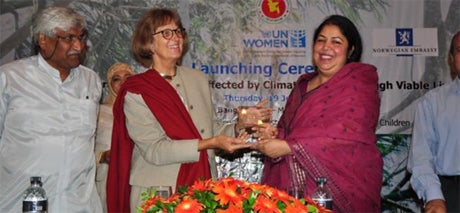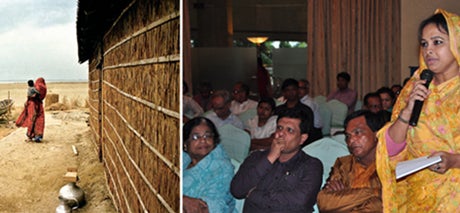The Change Makers: The Role of Women in Mitigating Climate Change
Date:
Dhaka - The fight against climate change received a shot in the arm when a new, innovative method of meeting the challenge was formulated. UN Women, in collaboration with the Bangladesh Centre for Advanced Studies (BCAS) and BRAC launched a three-year programme titled Reducing Vulnerability of Women Affected by Climate Change through Livelihood Options, which is being supported by the Royal Norwegian Embassy in Dhaka.

Aimed at creating livelihood options for and with women, the program also focuses on reducing the vulnerability of communities to climate change. The project, currently based on a knowledge framework derived from local surroundings, has the potential to go global.
The programme will cover ten districts that are the poorest and most vulnerable. From Satkhira, Bagerhat, Patuakhali, Khulna and Cox’s Bazaar in coastal areas, to drought prone districts , Nawabganj and Natore, as well flood prone districts – Sirajganj, Sunamganj and Shariatpur.
The Background: Weather and Women
In most developing nations, the culture of the post colony often reduces women to silent members of the labour force, without voice or agency. Despite their limited engagement with the economy of men, they, as creators of the homestead, are the biggest users of natural resources such as land, trees, housing and extension support. Yet women are seldom decision-makers when it comes to how these resources are consumed or managed. Natural disasters remain a regular and annual occurrence in Bangladesh, owing to its location and topography. This vulnerability of the land is reflected in its women too–with the lowest asset base and least adaptive capacity, they are most at risk when these disasters occur.
Recognising the Need
The launch of the programme began with a screening of a documentary on the impact of climate change on Bangladesh, even as several dignitaries from the Government encouraged this project as timely and pertinent. Shirin Sharmin Chaudhury, the honourable State Minister, Ministry of Women and Children’s Affairs (MoWCA), said, “Although significant progress has been made to achieve gender equality and promote women’s participation in both public and private spheres, they remain most vulnerable to natural calamities. They have limited access to resources and opportunities.”
In addition to Dr Chaudhury as chief guest, Mr. Mesbah-ul-Alam, Secretary, Ministry of Environment and Forest (MOEF), H.E. Ragne Birte Lund, Ambassador, Royal Norwegian Embassy were invited as special guests. Dr Atiq Rahman of BCAS, Mr. Rezaul Kabir of BRAC, representatives from the Shariatpur and Sunamganj Upazillas, Ms. Naheed Ahmed, National Programme Manager, UN Women Bangladesh Programme Office, UN Women officials and members of the media attended as well. The joint initiative brings together central and local governments and representatives of local communities, all of whom have emphasised the participation of women in decision-making processes.
The Aim and Scope: The World In Her Hands
This programme aims at sewing together the gap between knowledge and implementation. It seeks community intervention at the local level, with women at the helm as climate adaptation champions. This initiative builds on the work that UN Women has already done in Bangladesh to increase women’s leadership and economic empowerment. The focus is building their skill-set for both the internal and external employment market. In the course of the launch, Ambassador Lund explained how central women’s leadership is to the climate change issue. “With the new project one seeks to strengthen women’s knowledge and expertise through pre and post-disaster leadership training. Moreover, the project will create new livelihood options for local communities living in disaster prone areas, based on the knowledge and experiences of local women,” she said.
Looking Ahead
The programme not only deals with providing women an alternative means to earn their living even when calamity strikes, it’s also supporting the Government’s agenda of mainlining gender in the climate change discussion. By identifying Realising Gender Equality and Empowerment as one of the seven priority areas in its Outline Perspective Plan and the Sixth Five-Year Plan, the Government will address the impending threat of climate change and the specific impact it has on women. Qualitative research, done to identify the priorities of women, will form a basis to advocate policy change—one that seeks to integrate gender responsive adaptation and mitigation measures as well as changes in livelihood options for women. The long-term goal is that local communities will eventually take ownership and become stakeholders in their own development.
